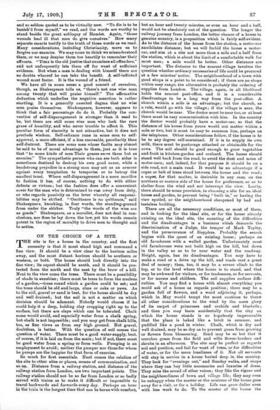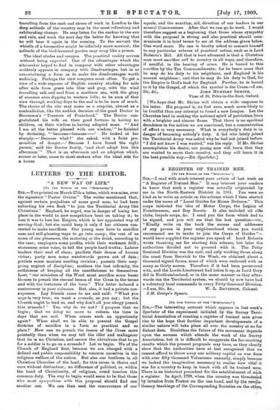ON THE CHOICE OF A SITE.
THE site ie for a house in the country, and the first necessity is that it must stand high and command a fine view.. It should be a view clear to the horizon miles away, and the most distant horizon should be southern or western, or both. The house should look directly into the fine view; its aspect should be south, and it should be pro- tected from the north and the east by the brow of a hill. Next to the view come the trees. There must be a possibility of shade in sunshine; there must be trees to form the nucleus of a garden,—trees round which a garden could be set; and the trees should be old and large, elms or oaks or yews. As to the soil, gravel or sand is best, for the house should be dry and well drained; but the soil is not a matter on which decision should be adamant. Nobody would choose if he could help it a deep, holding clay cropping right up to the surface, but there are clays which can be tolerated. Chalk some would avoid, and especially water from a chalk spring, but chalk is not impossible; and you may get from chalk hills, too, as fine views as from any high ground. But gravel, doubtless, is better. With the question of soil comes the question of water. There must be a good water-supply, best, of course, if it is laid on from the main ; but if not, there must be good water from a spring or from wells. Pumping is an employment to avoid; neither the pumper nor those for whom he pumps are the happier for that form of exercise.
So‘ much for first essentials. Next comes the relation of the site to other sites or places, means of communication, and so on. Distance from a railway station, and distance of the railway station from London, are two important points. The railway station should not be so far from London or so badly served with trains as to make it difficult or impossible to travel backwards and forwards every day. Perhaps an hour in the traiu is the longest time that can be borne with comfort, but an hour and twenty minutes, or even an hour and a half, would not be absolutely out of the question. The longer the railway journey from London, the better chance of a house in genuine country, is a proposition which is fairly self-evident. As to the distance of the house from the station, a motor-car annihilates distance; but we will forbid the house a motor- car, and aim at a site not more than a mile and a half from the station, which is about the limit of a comfortable walk for most men; a mile would be better. Other distances are important. The distance to the nearest village involves the question whether ordinary necessaries of life could be procured at a few minutes' notice. The neighbourhood of a town with good shops is a point to be considered ; if there are no shops within easy range, the alternative is probably the ordering of supplies from London. The village, again, in all likelihood holds the nearest post-office, and it is a considerable disadvantage to be a long way from the post-office. A church within a mile is an advantage; but the church, as a rule, would go with the village ; if the village is near, the church would be near. The doctor must be near too, or at least there must be easy communication with him. In the country the doctor would probably have a. motor-car, so that the distance of his house from yours would not matter within a mile or two, but it must be easy to summon him, perhaps on the telephone. Other considerations follow, if the house is to be to any degree self-contained. If it is to supply its own milk, there must be pasturage attached or obtainable for the cows. The soil should be good enough to grow vegetables and fruit in kitchen-garden and orchard. The house should stand well back from the road, to avoid the dust and noise of motor-cars; and, indeed, for that purpose it should be on a side road, not a main road. It would be an advantage if a copse or belt of trees stood between. the house and the road; a copse, for that matter, is desirable in any case, on the northern or eastern side of the house for preference, so as to shelter from the wind and not interrupt the view. Lastly, there should be some provision, in choosing a site for an ideal house and garden, to prevent being "built in," or having the view spoiled, or the neighbourhood cheapened by bad and tasteless building.
There are all the necessary conditions, or most of them, and in looking for the ideal site, or for the house already existing on the ideal site, the counting of the difficulties and the disadvantages is a business which demands the discrimination of a Judge, the temper of Mark Tapley, and the perseverance of Sisyphus. Probably the search begins with the quest of an existing house; perhaps an old farmhouse with a walled garden. Unfortunately most old farmhouses were not built high on the hill, but down in the valley so as to be near water and the roadway. Height, again, has its disadvantages. You may have to make a road or a drive up the hill, and roads cost a great deal of money; then, too, it may be a severe climb to the top, or to the level where the house is to stand, and that may be awkward for visitors, or for tradesmen, or for servants, or for nurses and children. The soil supplies endless diffi- culties. You may find a house with almost everything you could ask of a house as regards position ; there may be a garden full of flowers, and a wood adjoining it, perhaps, which in May would tempt the most cautious to throw all other considerations to the wind by the mere glory of its carpet of primroses and orchids and bluebells ; and then you may learn accidentally that the clay oil which the house stands is so hopelessly impermeable that the place is baked like a brick in summer, and puddled like a pond in winter. Chalk, which is dry and well drained, may be so dry as to prevent grass from growing or flowers from blossoming. Sand may be so hot that it scorches grass from the field and wilts flower-borders and shrubs in an afternoon. The site may be perfect as regards soil and position, and fail for want of trees, or for difficulties of water, or for the mere loneliness of it. Not all servants will stay in service in a house buried deep in the country. They look for "evenings out," and Sunday walks, and shops where they can buy little necessaries and luxuries of dress. They miss the sound of other voices; they like the vigour and the neighbourliness of town and village life ; they may even be unhappy when the master or the mistress of the house goes away for a visit, or for a holiday. Life can grow duller even with less work to do. To the master of the house the traielling from the rush and stress of work in London to the deep solitude of the country may be the most refreshing and exhilarating change.. He may listen for the cuckoo in the sun and rain, and work the next day the better for knowing that he will hear it again in the evening. To the servant the whistle of a locomotive might be infinitely more musical; the solitude of the bird-haunted garden may wrap like a prison.
The ideal eludes and escapes. The practical reality arrives without being expected. One of the advantages which the site-seeker hoped to find in company with other advantages suddenly appears in company with disadvantages, but in so overwhelming a fora' as to make the disadvantages worth enduring. Perhaps the view conquers most often. To get a view of a wide expanse of English country shading for mile after mile from green into blue and grey, with the wind travelling salt and cool from a southern sea, with the glory of summer suns dipping to western hills; to be sure of that view through working days to the end is to be sure of much. The choice of the site may come as a surprise, almost as a contradiction, like the sudden decision of the good Doctor in Stevenson's "Treasure of Franchard." The Doctor con- gratulated his wife on their good fortune in having no children, on their wisdom in having adopted none. " ' And I am all the better pleased with our wisdom,'" he finished by declaring, "because—because—' He looked at her sharply.—' Because what ?' she asked, with a faint pre- monition of danger.—' Because I have found the right person, said the Doctor firmly, 'and shall adopt him this afternoon." That is an afternoon and an adoption which, sooner or later, come to most seekers after the ideal site for a house.









































 Previous page
Previous page